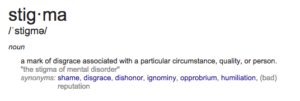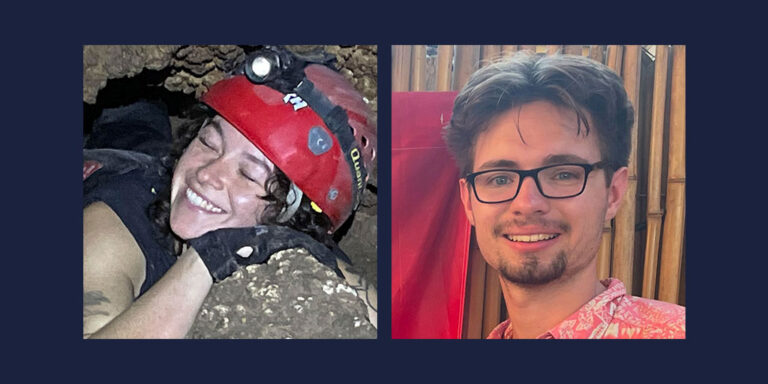Toward a More Healthy Discipline
 If one googles the word ‘stigma’ the definition that appears first on your screen (“a mark of disgrace associated with a particular circumstance, quality, or person”) is followed, as most definitions are, by a phrase showing how that word is commonly used; in this case the phrase that google uses is “the stigma of mental disorder.” I know that I shouldn’t be surprised by this, particularly given the recent publicity about Robin Williams and his secret battles with depression, but I was. I had assumed (obviously incorrectly) that in popular parlance a mental disorder was no longer considered a character flaw or mark of disgrace, but rather an illness that afflicts certain people and families and that is treated (like any illness) therapeutically. I have had several bouts of depression that have left me drained and feeling vulnerable, and anxiety is something I’ve come to live with but only after years of therapy and different forms of treatment. I haven’t felt ashamed of this, but then again I don’t make a habit of talking about my illness or mental health in general. But prompted by some wonderful colleagues who are proposing a new AAG committee on mental health in the discipline, that’s exactly what I want to do in this column.
If one googles the word ‘stigma’ the definition that appears first on your screen (“a mark of disgrace associated with a particular circumstance, quality, or person”) is followed, as most definitions are, by a phrase showing how that word is commonly used; in this case the phrase that google uses is “the stigma of mental disorder.” I know that I shouldn’t be surprised by this, particularly given the recent publicity about Robin Williams and his secret battles with depression, but I was. I had assumed (obviously incorrectly) that in popular parlance a mental disorder was no longer considered a character flaw or mark of disgrace, but rather an illness that afflicts certain people and families and that is treated (like any illness) therapeutically. I have had several bouts of depression that have left me drained and feeling vulnerable, and anxiety is something I’ve come to live with but only after years of therapy and different forms of treatment. I haven’t felt ashamed of this, but then again I don’t make a habit of talking about my illness or mental health in general. But prompted by some wonderful colleagues who are proposing a new AAG committee on mental health in the discipline, that’s exactly what I want to do in this column.
 For many of us October represents the midpoint of fall term when one can literally feel the anxiety level within our classrooms and hallways begin to rise. According to the American College Health Association’s 2013 survey[i], over 51% of undergraduate students felt overwhelming anxiety during the past twelve months, and almost 32 % felt so depressed that it was difficult to function (with a notable gender difference; in both cases higher numbers for women). Eight percent had seriously considered suicide. In the U.K., a study undertaken by the National Union of Students showed that one in five students reported that they had a mental health illness. And in geography we often encounter the additional challenge of requiring fieldwork for many of our courses and research, creating situations that may exacerbate mental health conditions.[ii] It’s a stark reality we face, and few of us know how to manage it. Academic leaders in Canada are ahead of the curve. Some Canadian universities are considering ways to reduce anxiety during peak, end-of-term periods by reworking exam schedules while others are training student leaders in mental health awareness in order to reach out to their peers. But for most faculty members, awareness of our students’ mental health comes in bits and pieces; notes from a disability office/health clinic, overheard anecdotes, or the student who is willing to share their illness. The big picture – the scope of the problem that has been referred to in some circles as having reached crisis proportions – has certainly eluded me and I suspect many faculty, with the effect that discussions about how to handle the situation are muted if at all present.
For many of us October represents the midpoint of fall term when one can literally feel the anxiety level within our classrooms and hallways begin to rise. According to the American College Health Association’s 2013 survey[i], over 51% of undergraduate students felt overwhelming anxiety during the past twelve months, and almost 32 % felt so depressed that it was difficult to function (with a notable gender difference; in both cases higher numbers for women). Eight percent had seriously considered suicide. In the U.K., a study undertaken by the National Union of Students showed that one in five students reported that they had a mental health illness. And in geography we often encounter the additional challenge of requiring fieldwork for many of our courses and research, creating situations that may exacerbate mental health conditions.[ii] It’s a stark reality we face, and few of us know how to manage it. Academic leaders in Canada are ahead of the curve. Some Canadian universities are considering ways to reduce anxiety during peak, end-of-term periods by reworking exam schedules while others are training student leaders in mental health awareness in order to reach out to their peers. But for most faculty members, awareness of our students’ mental health comes in bits and pieces; notes from a disability office/health clinic, overheard anecdotes, or the student who is willing to share their illness. The big picture – the scope of the problem that has been referred to in some circles as having reached crisis proportions – has certainly eluded me and I suspect many faculty, with the effect that discussions about how to handle the situation are muted if at all present.
And it’s not just undergraduate students who are experiencing high levels of anxiety and depression (and other mental disorders). I highlighted in my column last month the important work that graduate students do for our discipline and academic institutions, noting that they often conduct this labor in conditions that are not of their own choosing and certainly not well remunerated. Those conditions in addition to the uncertainties graduate students face in the academic job market create highly stressful situations that can often lead to anxiety disorders, depression and in rare instances suicidal behavior. Recent online news media have brought these issues to the fore, offering suggestions about how graduate programs can offer support for students’ mental health issues that range from openly acknowledging the problem to providing training for faculty teaching in these programs about how to recognize and address mental health issues.
 In my case, it was only after I left graduate school that my mental health became a concern. Unmoored from the networks of friends and colleagues from graduate school and living through the constant insecurities of one-year positions, my taken-for-granted coping strategies disintegrated and eventually disappeared, leaving me in a very dark world of despair. It literally was a struggle each day to make it through my classes and meetings without breaking down into tears, while at home I found it impossible to sleep (thus further deteriorating my mental health). I of course told no one, exacerbating my feelings of loneliness and estrangement and plunging me deeper into depression. Apparently my story is a fairly common one; a recent study has documented some of the factors that can lead to anxiety disorders and depression among contingent faculty, with the stress of non-permanent positions ranking high. The authors look to institutional change in order to combat some of these concerns, particularly since their findings suggest that it is the contingent faculty who are the most committed to their institution who suffer the most negative consequences in terms of feelings of anxiety and depression.
In my case, it was only after I left graduate school that my mental health became a concern. Unmoored from the networks of friends and colleagues from graduate school and living through the constant insecurities of one-year positions, my taken-for-granted coping strategies disintegrated and eventually disappeared, leaving me in a very dark world of despair. It literally was a struggle each day to make it through my classes and meetings without breaking down into tears, while at home I found it impossible to sleep (thus further deteriorating my mental health). I of course told no one, exacerbating my feelings of loneliness and estrangement and plunging me deeper into depression. Apparently my story is a fairly common one; a recent study has documented some of the factors that can lead to anxiety disorders and depression among contingent faculty, with the stress of non-permanent positions ranking high. The authors look to institutional change in order to combat some of these concerns, particularly since their findings suggest that it is the contingent faculty who are the most committed to their institution who suffer the most negative consequences in terms of feelings of anxiety and depression.
I wonder, however, what we as an association and discipline can do to help. I finally recovered from depression by reaching out to some very good friends who encouraged me to find professional treatment. But I know that if I had been able to talk about what was happening with my colleagues without feeling shame that I would have recovered much sooner. I also realize that if I had received training about how to recognize and deal with clinical depression and anxiety disorders I would have (hopefully) recognized those symptoms in myself and been more equipped to handle them. This (among other things) is exactly what the proposed new AAG committee will take on as its mission. Spearheaded by Beverley Mullings, Kate Parizeau, and Linda Peake, a group of geographers organized a series of sessions at last year’s AAG meeting on mental health issues, established a listserv (MHGEOG-L [at] lists [dot] queensu [dot] ca), and are now proposing to establish a standing committee of the AAG. The proposed Committee on the Status of Mental Health in Geography will conduct research into the scope of the problem and assess the policies of other organization and institutions, provide professional guidance to the Council, the AAG, and geography departments in terms of protocols and ethical issues related to mental health, and engage in advocacy and awareness-raising within the AAG and academic institutions. I think this is a very important and long-overdue step that we need to take. The word “stigma” should not be a presumed outcome of “mental disorder.” I welcome your thoughts.
[i] See American College Health Association, American College Health Association-National College Health Assessment II: Reference Group Undergraduates Executive Summary Spring 2013, Hanover, MD: American College Health Association, 2013.
[ii] See Jacky Birnie and Annie Grant, Providing Learning Support for Students with Mental Health Difficulties Undertaking Fieldwork and Related Activities, Gloucestershire, U.K.: Geography Discipline Network and Geography and Environmental Research Unit, University of Gloucestershire, 2001



